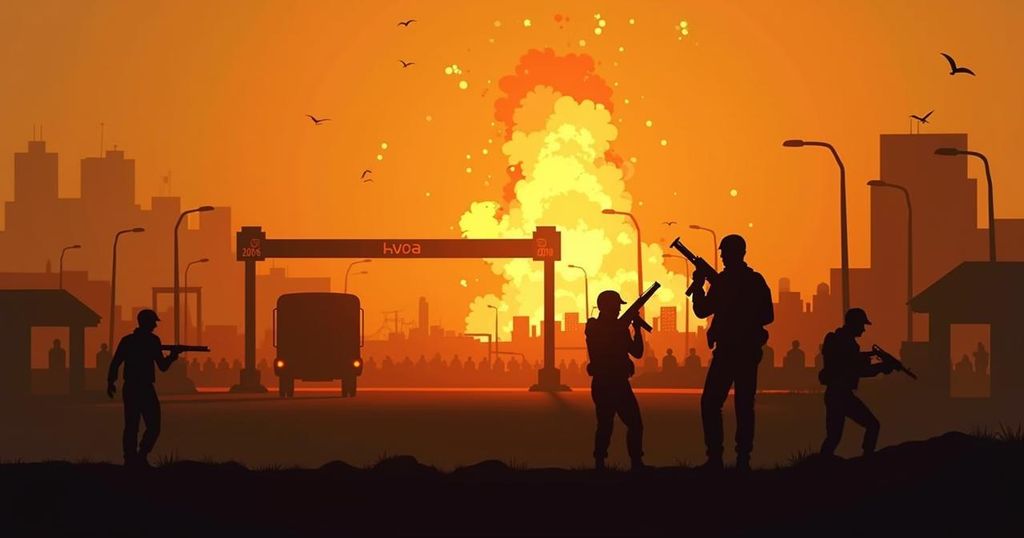Israeli Airstrikes Target Beirut and Shut Down Key Lebanon-Syria Border Crossing
Israel conducted extensive airstrikes in Beirut, targeting areas linked to Hezbollah while also cutting off the crucial Masnaa border crossing to Syria, amid escalating tensions following a recent military incursion into Lebanon. Iranian support for Hezbollah adds complexity to the situation, as regional conflicts threaten to destabilize the area further.
Israel conducted extensive airstrikes overnight in the southern suburbs of Beirut, Lebanon, as well as an assault that severed the crucial Masnaa border crossing between Lebanon and Syria. This military action follows warnings from Israel for residents in southern Lebanon, outside a UN-declared buffer zone, to evacuate due to escalating conflicts with Hezbollah, recognized as a terrorist organization by Israel. The hostilities intensified after Israel initiated a ground incursion into Lebanese territory, leading to clashes with Hezbollah fighters. Prior attacks escalated tensions by eliminating key Hezbollah figures, including their long-serving leader, Hassan Nasrallah. On a diplomatic front, Iranian Foreign Minister Abbas Araghchi visited Beirut, amid rising tensions following Iran’s recent missile strikes on Israel. As the primary supporter of Hezbollah, Iran’s role is crucial, providing the group with military resources and financial backing. The airstrikes in Beirut resulted in substantial explosions, sending flames and smoke skyward and shaking structures across the Lebanese capital. Reports indicate that over ten airstrikes targeted the area on Thursday, leading to significant disruptions at the Masnaa border crossing, which had been a primary route for tens of thousands of refugees fleeing conflict. Video evidence revealed that the strikes created large craters that forced civilians to traverse the area on foot. The Israeli military has previously accused Hezbollah of attempting to transport military equipment via this border route. The Masnaa crossing, essential for the transfer of arms from Iran to Hezbollah through Syria, is now rendered unusable for the first time since the outbreak of the current conflict on October 7, 2023, when Hamas launched an attack on Israel, prompting widespread reprisals. Moreover, the Israeli army carried out a targeted strike in Tulkarem, a known stronghold for terrorist activities in the West Bank, resulting in casualties, including numerous civilians. The ongoing violence has resulted in significant fatalities on both sides, with reports indicating a rising toll in the ongoing conflict among regional players.
The situation in Lebanon and its border with Syria has deteriorated significantly as regional conflicts intensify. The longstanding hostilities between Israel and Hezbollah have been exacerbated by recent conflicts involving Hamas, leading to increased military engagements. The airstrikes are part of a broader military strategy by Israel to weaken Hezbollah, particularly in light of its ties with Iran, which has provided substantial military assistance to the group. The Masnaa Crossing has historically been a key route for the movement of people and goods, making its closure a critical development in the ongoing conflict and reflecting the volatility of the situation in the region. Overall, the recent escalation of violence signifies a potential shift in the dynamics of regional security and aligns with broader strategic aims amid ongoing Israeli operations in response to perceived threats from Hezbollah and Iran.
In summary, the recent Israeli airstrikes in Beirut and the closure of the Masnaa border crossing mark a significant escalation in the ongoing conflict involving Hezbollah and regional dynamics with Iran. As the violence persists and casualties mount on all sides, the humanitarian implications are severe, presenting challenges for civilians caught in the crossfire. This situation not only indicates a heightened military presence but also serves as a reminder of the fragile security environment in the Middle East, warranting close international attention and potential diplomatic interventions.
Original Source: nypost.com




Post Comment